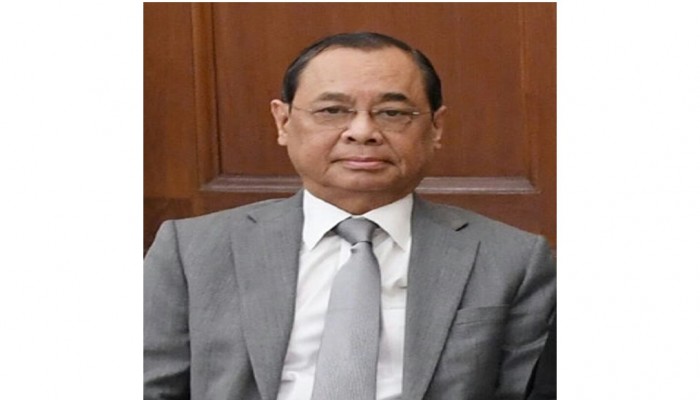The hypocrisy of the intellectually bankrupt Congress-cabal over Justice Gogoi’s Rajya Sabha nomination
- In Politics
- 10:37 AM, Mar 19, 2020
- Shwetank Bhushan
Four months after he bid farewell to the Supreme Court as Chief Justice of India, President Ramnath Kovind nominated eminent jurist Ranjan Gogoi to the house of elders, the Rajya Sabha under Article 80 of the Constitution of India.
Within an hour of the nomination, the Congress Party gave it a political twist by linking it to the verdicts given by him. Many opposition leaders, as well as the Congress's ecosystem in the media, joined the chorus to raise questions, and the former CJI was pushed into the eye of a political storm.
In 2018, when Justice Ranjan Gogoi addressed a press conference in the open lawns of the Supreme Court, against the then Chief Justice Deepak Mishra, he was hailed as a hero by the Congress party and its ecosystem.
"Justice Ranjan Gogoi's thoughtful articulation continues to give us hope. Democracy needs not only independent judges like Justice Ranjan Gogoi and noisy journalists but independent journalists and noisy judges," said senior Congress leader Kapil Sibal.
Now the same cabal is insinuating that the Ayodhya verdict that was given by a bench of 5 eminent judges was biased raising doubts on their personal integrity. Look at the bizarre logic of this intellectually shallow cabal. If the judge gives judgment in favor of the government, his nomination to Rajya Sabha is under question. If the same judge gives a judgment that politically favors the opposition, his nomination is fair. They forget that what is sauce for the goose is sauce for the gander.
Their entire brouhaha is peddled here is under the garb of "an assault on the independence of the judiciary." It is ironic to see Congressi-Cabal cribbing about justice Gogoi's nomination to the Rajya Sabha by the President, who had an impeccable career as a jurist. Here are some instances of Congress's misadventures with the judiciary, damaging its reputation by offering post-retirement rewards to controversial Judges, put together for the record.
- In 1973, Justice A N Ray's appointment by Indira Gandhi regime, superseding 3 senior judges, was an open attack on the independence of the judiciary. The appointment was made very next day of SC's constitution bench outlining the 'basic structure' doctrine of the Constitution.
- There is no doubt that the Emergency imposed by the Indira Gandhi government in 1975 will remain the most terrible blemish on India's democracy and the worst assault on the independence of the Indian judiciary than anything in the last century. The 42nd Amendment to the Constitution of India attempted to reduce the power of the Supreme Court and High Courts to rule upon the constitutional validity of laws.
- The Black Day of 1977: Immediately after the Habeas Corpus judgment, which said that "citizens have no right to life and liberty during a national emergency," came the second controversial supersession. Justice Mirza Hameedullah Beg superseded Judge H R Khanna, the lone dissenter in the case. Justice M H Beg was after retirement made the Director of the National Herald Group of the Congress and was also rewarded with Padma Vibhushan.
- The most ironic of all is the case of Justice Baharul Islam, who was a Congress Rajya Sabha MP since 1962. He resigned from the Rajya Sabha and was appointed a Judge of Guwahati High Court in 1972. In an unprecedented move, after retiring as Chief Justice of the Gauhati HC, he was recalled and made a Judge in the Supreme Court. Interestingly, as an SC Judge, Justice Baharul Islam delivered a controversial Judgment absolving Bihar (Congress) CM Jagannath Mishra in the urban cooperative bank scam. Once again, in 1983, he resigned from the Supreme Court and was elected to the Rajya Sabha as a Congress party candidate.
- In 1985, a poor 62-year-old Muslim woman Shah Bano went to the court seeking Rs. 200/month from her husband, for supporting her 5 children on being deserted after Triple-Talaq. Both the High Court and the Supreme Court ruled in Shah Bano's favor. In 1986, the Rajiv Gandhi government, only to appease the clerics, overruled the Supreme Court's verdict with brute force in the Parliament.
- Who can forget Justice Ranganath Misra, who under his single bench commission, absolved Congress in the 1984 anti-Sikh pogrom? He was first appointed as the Chief Justice of India, then was made the first Chairman of the NHRC. He then appointed as the Chairman of the NCRC for Religious and Linguistic Minorities and also the Chairman NCSC/ST. He was also elevated as a member of Rajya Sabha from 1998 to 2004 from the Congress Party headed by Sonia Gandhi.
- In 1993 the Congress Party in Lok Sabha argued and defended the first-ever impeachment motion of Justice V Ramaswami in India's judicial history. The impeachment motion failed when Congress MPs walked out during voting. Before the proceedings, the Speaker constituted a fact-finding committee that reported gross misappropriation of funds by Justice Ramaswami in its findings. But Ramaswamy was a Rajiv Gandhi's hand-picked judge, whose son was a Congress MLA, and his lawyer, Kapil Sibal of Congress.
- In 1997, Congress government appointed Justice Aziz Mushabber Ahmadi, a lifetime chairman of the Bhopal Memorial Hospital Trust, created with funds from Union Carbide. Ironically, the same jurist was part of a bench that diluted the charges against the Bhopal Gas-Leak accused, whose nexus with the Rajiv Gandhi government is known globally.
- In 2007, the Congress party headed by Sonia Gandhi made Justice K. G. Balakrishnan, the Chief Justice of India, without being eligible. He saved countless Congressmen and its allied leaders, like giving bails to Lalu Prasad Yadav. Justice Balakrishnan faced charges that his family members amassed wealth disproportionate to their known sources of income and was also accused of suppressing the fact that A Raja was interfering with the course of justice and approving false RTI replies about the assets of judges. Post-retirement Congress party rewarded him with Chairmanship of NHRC.
- In 2018, in a crude attempt to stall the verdict on the Ram Janmbhoomi case, CJI Dipak Misra's impeachment motion was brought by the Rahul Gandhi led Congress Pary. It was known from the beginning that his impeachment motion was only theatrics to intimidate the Chief Justice of India.
- Justice Abhay Thipsay, who handled several sensitive cases like involving Congress's interest, like the Best Bakery case and Sohrabuddin encounter case and gave various judgments in cases having political consequences. He finally joined the Congress party before the 2019 elections.
Are we to forget all that?
The Congress Party and its intellectually bankrupt cabal should know that they can never preach high moral ground, especially concerning judicial integrity. The habit of this cabal is to try to slam the government on each and every topical news. Especially over the last couple of years, the judiciary has become the epicenter of their slandering because of several significant political and social judgments.
It is unfortunate that in this entire politically motivated blame-game slugfest, they selectively ignore the fact that being a president's nominee is way different than standing as a candidate of a political party. They deftly ignore the real basis for which the architects of our Constitution brought in the presidential nomination of eminent people from different walks of life, believing they would lend their wisdom to the upper house.
A retired judge cannot be nominated by the president to the upper house, but practicing advocates with political parties as clients can be a member of the same house. And the same lot also talks about judicial integrity. Hypocrites!
The following tweet of RS Member Swapan Dasgupta ignores all such attempt of slandering and sums up, justice Gogoi's nomination well:
https://twitter.com/swapan55/status/1240094200403615745
I see nothing wrong whatsoever that an eminent jurist like Ranjan Gogoi, who had an impeccable career, is nominated to the house of elders, the Rajya Sabha. There have been various eminent jurists who have been chosen by the President, accepted and contributed with their wisdom not only with neutrality but also objectivity to the Rajya Sabha debates.
Disclaimer: The opinions expressed within this article are the personal opinions of the author. MyIndMakers is not responsible for the accuracy, completeness, suitability, or validity of any information on this article. All information is provided on an as-is basis. The information, facts or opinions appearing in the article do not reflect the views of MyindMakers and it does not assume any responsibility or liability for the same.







Comments